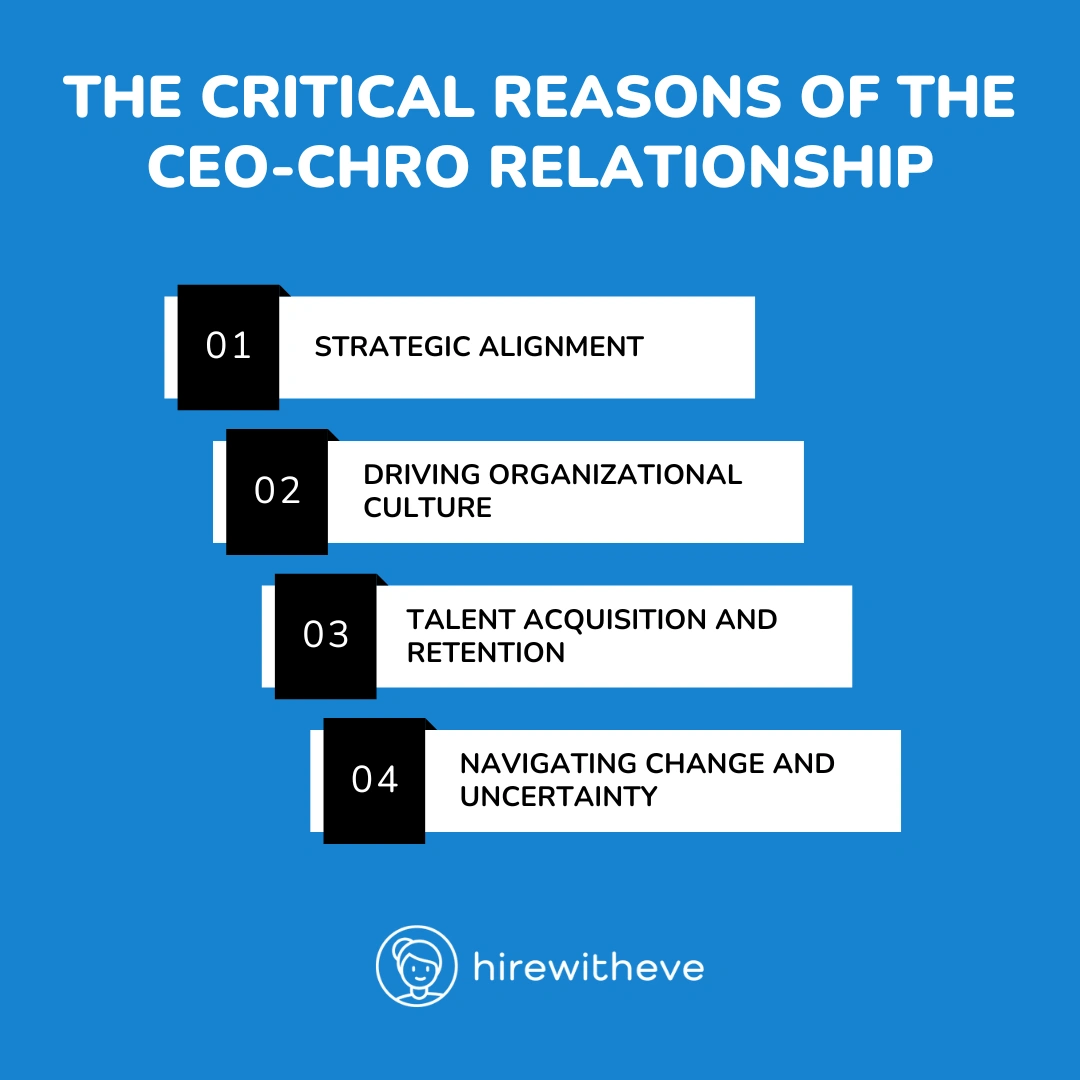The Critical Relationship Between CEO and CHRO in Today’s Age
The Critical Relationship Between CEO and CHRO in Today’s Age

The corporate world is rapidly evolving, and so are the dynamics within executive teams. Among the most significant relationships in modern organizations is the relationship between CEO and CHRO. As businesses increasingly prioritize talent management, culture, and employee well-being, the synergy between these two roles becomes paramount.
HR managers and talent acquisition specialists must recognize the importance of this partnership, as it directly influences hiring strategies, employee retention, and organizational growth. In today's age, understanding and fostering the relationship between CEO and CHRO can lead to a competitive edge in the marketplace.
Table of contents
The Role of the CEO and CHRO in Modern Organizations
In traditional corporate structures, the CEO was often viewed as the ultimate decision-maker, focusing primarily on financial performance and business growth. The CHRO, on the other hand, was tasked with managing people and handling operational HR tasks. However, the relationship between CEO and CHRO has transformed significantly over the past decade. With talent being a company's most valuable asset, the CHRO has evolved into a strategic partner that influences company culture, employee engagement, and leadership development.
CEOs now rely on CHROs not just for day-to-day HR operations but for shaping the overall organizational strategy. The CHRO’s ability to provide insights on workforce trends, future talent needs, and the company’s cultural alignment with its goals is crucial for long-term success. This shift highlights why the relationship between CEO and CHRO is no longer a background dynamic but a central force driving the company's future.
Why the Relationship Between CEO and CHRO is Critical?
The relationship between CEO and CHRO is critical for several reasons, all of which affect an organization's overall performance and adaptability in the market.

Strategic Alignment
The CEO sets the vision for the company, while the CHRO ensures that the workforce aligns with that vision. When these two executives work closely together, they can create a culture that not only reflects the company’s values but also attracts and retains top talent. This alignment is key to driving business growth, as employees who are engaged and aligned with company goals are more productive and innovative.
Driving Organizational Culture
The relationship between CEO and CHRO has a direct impact on company culture. A positive, forward-thinking culture is essential for employee satisfaction, productivity, and retention. CHROs, with their deep understanding of the workforce, work closely with CEOs to shape a culture that fosters collaboration, inclusivity, and growth. This partnership ensures that cultural initiatives are supported at the highest level, making them more effective and long-lasting.
Talent Acquisition and Retention
In today’s competitive job market, acquiring and retaining top talent is a constant challenge. The relationship between CEO and CHRO plays a crucial role in developing strategies that attract high-quality candidates and keep them engaged over the long term. By working together, they can craft an employee value proposition (EVP) that appeals to the right talent pools, aligning hiring practices with the company’s strategic objectives.
Navigating Change and Uncertainty
The business landscape is constantly evolving, whether due to technological advancements, global pandemics, or shifts in market demands. The relationship between CEO and CHRO is critical in times of uncertainty, as they must collaborate to ensure the workforce remains agile and adaptable. CHROs provide CEOs with insights into how employees are coping with change and how the company can better support them during transitions.
Surveys and Data: How the CEO-CHRO Dynamic Impacts Organizational Success
Several studies and surveys underscore the importance of a strong relationship between CEO and CHRO. According to a 2023 study by Deloitte, organizations where the CEO and CHRO worked closely together saw a 20% increase in employee engagement scores compared to those where the relationship was less collaborative. This increase in engagement translates into higher productivity, lower turnover rates, and overall better performance.
Another survey by McKinsey found that companies with a strong relationship between CEO and CHRO were more likely to outperform their peers in terms of revenue growth. These organizations also reported being better positioned to handle crises, such as the COVID-19 pandemic, due to a strong alignment between business strategy and people strategy.
The data makes it clear: the relationship between CEO and CHRO isn’t just about internal harmony. It directly influences the company’s ability to compete, innovate, and grow.
Conclusion
As the demands on both CEOs and CHROs continue to grow, platforms like HirewithEve become essential in fostering this critical relationship. HirewithEve’s suite of tools is designed to support HR teams in making data-driven decisions, aligning talent strategies with business goals, and improving hiring efficiency. By utilizing features such as skills-based assessments, data analytics, and remote hiring solutions, HirewithEve helps CHROs provide valuable insights to CEOs. This ensures that the workforce remains a strategic asset in driving the company forward.
Ultimately, strengthening the relationship between CEO and CHRO is not just about communication and collaboration — it’s about using the right tools to support a shared vision. HirewithEve’s platform makes it easier for HR leaders to align their strategies with the company’s broader goals, ensuring that the workforce is equipped to meet the challenges of today’s dynamic business environment.
Target Your Talent
Unlock tailored solutions for your recruitment and hiring needs with Eve Platform's extensive case study library.
Subscribe now to enhance your HR expertise and excel in your role.
Free Resources

Transforming Hiring: 7 Key Recruiting Metrics
Enhancing recruitment processes with data-driven insights for better hiring outcomes.

Reducing Hiring Bias with Hirewitheve.
Utilizing Hirewitheve to combat bias and streamline recruitment processes effectively.

Hiring Detail-Oriented Candidates
HirewithEve enhances hiring by accurately assessing candidate's attention to detail-oriented.
